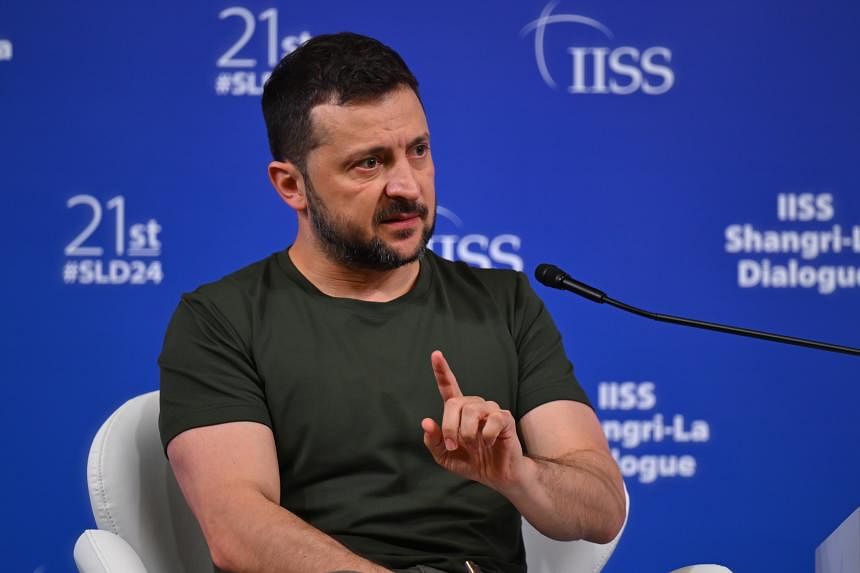Shangri-La Dialogue 2024: Commentary
Zelensky’s surprise visit highlights how security between Europe and Asia-Pacific is interlinked

There was an unmistakable buzz in the air as dozens of journalists, hotel guests and conference delegates descended on the lobby of Singapore’s Shangri-La Hotel on the evening of June 1, roused by chatter that a surprise guest was en route.
They secured their viewing spots and ended up waiting more than an hour, but no matter.
When Ukrainian President Volodymyr Zelensky finally arrived just before 6pm, sporting his familiar black round-neck T-shirt and slacks, he was welcomed like a rock star. Cameras went crazy as he walked past escorted by a security detail, marking an exciting end to the second day of the Shangri-La Dialogue.
Mr Zelensky’s surprise attendance in the middle of Asia’s leading security forum effectively thrust Russia’s invasion of Ukraine to the forefront of everyone’s minds.
He was keen to also forcefully demonstrate how interconnected the security issues in Europe and Asia are.
“I think it’s absolutely important for (Zelensky) to be here,” said General Carsten Breuer, Germany’s Chief of Defence. “This is a forum for him to really tell people how pressing the situation is, and what consequences this war has on the rules-based international order, not only in that region, not only in Ukraine and Europe, but also in the world.”
In truth, this deepening interconnectedness had already been raised at some panel discussions before Mr Zelensky’s arrival – and not just by European Union defence officials.
South Korea’s Defence Minister Shin Won-saik said on June 1 there is more evidence suggesting the Russians are using weapons in the Ukraine war that were illegally imported from North Korea.
Yet it took Mr Zelensky’s physical presence in Singapore to force the spotlight on how the conflict in Europe is so interlinked with the erstwhile faraway Asia-Pacific.
One issue brought to the top of most delegates’ minds was China’s ties with Russia. And whether the Chinese delegation would meet Mr Zelensky while he was in Singapore. After all, the Ukrainian President had travelled so far, even as Russia launched a large missile and drone attack against Ukraine’s critical infrastructure.
Days ahead of the Shangri-La Dialogue, China had said that it would be “difficult” to attend a Ukraine-backed peace summit, set for mid-June in Switzerland, if Russia did not participate.
Mr Zelensky later revealed in a press conference on June 2 that he did not manage to meet any Chinese officials in Singapore. Citing Ukrainian intelligence reports, he also claimed Beijing has been supplying the Russians with military equipment for the war in his country.
This directly contradicts China’s previous pledges that it will not supply Russia with military equipment. This was reiterated by China’s Minister for National Defence, Admiral Dong Jun, in his speech delivered earlier that day, when he said China has placed strict limits on dual-use technology exports.
Dutch Defence Minister Kajsa Ollongren said: “I think Russia does not have many arms suppliers. We know Iran, we know North Korea. So, I think we must hold China to what they say, so that they will not provide weapons.” She added: “Russia cannot... build their war economy and their arms industry without a certain wealth or spare parts.”
The existential fear, of course, is that Russia will go on to invade other bordering countries, if President Vladimir Putin succeeds in fully occupying Ukraine.
“Helping Ukraine defend itself is very much like preventing the next war from occurring. In Europe, it’s about defending our interests in advance,” said Mr Robert Kupiecki, Poland’s undersecretary of state at its Ministry of Foreign Affairs. “So Ukraine essentially is buying us time – that is, if something bad is going to happen.”
Meanwhile, the timing of Mr Zelensky’s appearance in Singapore also stole China’s thunder somewhat.
The third and final day of the Shangri-La Dialogue is when China typically gets the almost-last word at the early plenary session. It presents an opportunity for the Chinese delegates to respond to the US, whose defence secretary typically fires the first salvo with Washington’s position the day before.
This year, Adm Dong’s warning that anyone who dares split Taiwan from China will be “crushed to pieces” was strident. But its effect on the delegates was soon dimmed by their anticipation of what was to come – Mr Zelensky’s appearance at the closing plenary and press conference.
While Mr Zelensky got the last word at Shangri-La this year, it remains to be seen if his message of interconnectedness will gain any real traction.
And despite enjoying a rockstar welcome, he could not get Asian leaders like Indonesia’s President-elect Prabowo Subianto to commit to attending his peace summit in Switzerland.
Even buzz has its limits.
https://news.google.com/rss/articles/CBMihwFodHRwczovL3d3dy5zdHJhaXRzdGltZXMuY29tL3NpbmdhcG9yZS96ZWxlbnNreS1zLXN1cnByaXNlLXZpc2l0LWhpZ2hsaWdodHMtaG93LXNlY3VyaXR5LWJldHdlZW4tZXVyb3BlLWFuZC1hc2lhLXBhY2lmaWMtaXMtaW50ZXJsaW5rZWTSAQA?oc=5
2024-06-02 21:00:00Z
CBMihwFodHRwczovL3d3dy5zdHJhaXRzdGltZXMuY29tL3NpbmdhcG9yZS96ZWxlbnNreS1zLXN1cnByaXNlLXZpc2l0LWhpZ2hsaWdodHMtaG93LXNlY3VyaXR5LWJldHdlZW4tZXVyb3BlLWFuZC1hc2lhLXBhY2lmaWMtaXMtaW50ZXJsaW5rZWTSAQA
Tidak ada komentar:
Posting Komentar